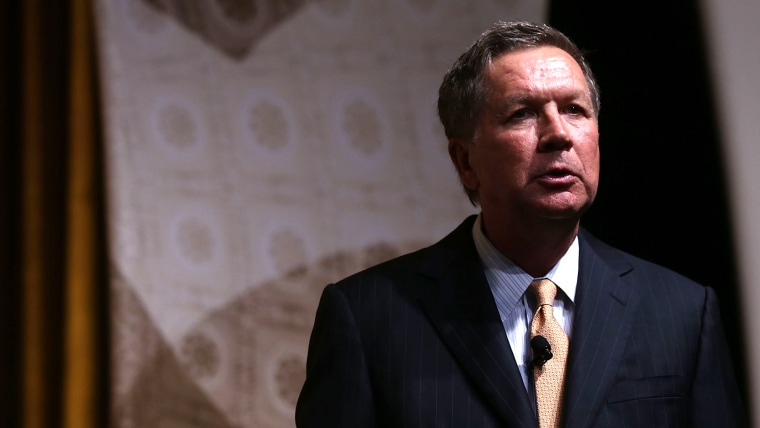It was four years ago last week when the eight Republican presidential candidates participated in a debate and were asked an important question: Fox's Bret Baier asked the Republican field whether the candidates would accept a debt-reduction deal in which they received $10 in spending cuts for every $1 in tax increases.
Not one of the candidates raised their hand -- a reaction that drew raucous applause from the GOP audience in attendance. It was a striking display, highlighting Republican hostility to compromise, even when a proposed deal is stacked ridiculously in their favor.
The whole incident, lasting only about 26 seconds, quickly became emblematic of GOP radicalism and inflexibility. Anyone who's the least bit curious about why constructive, bipartisan policymaking is impossible need only watch the clip.
Four years later, Jeb Bush, who used to support a 10-to-1 deal in Republicans' favor, has since changed his mind and would reject such an offer. On CBS's "Face the Nation," host John Dickerson asked Ohio Gov. John Kasich (R) yesterday whether he'd take the same deal.
DICKERSON: So, you balanced the budget the last time it was balanced in Washington. You say you want to bring folks together. In the last campaign, all the Republican candidates were asked a question. And they were asked, would you accept $1 in tax increases for $10 in spending reductions? And not a single Republican said they would take that deal. Democrats say they want some kind of tax increases. Would you take that deal? KASICH: John, I wouldn't at this point, because when we were in our fighting with the Clinton administration and actually went through a government shutdown, we cut taxes, which allowed economy to grow.... What we learn is that, no, no, if the government takes more, they will spend it.
It's almost amusing how wrong this is.
First, Dickerson's question itself was arguably a little too generous. Kasich, of course, didn't balance the budget. In 1993, then-President Clinton signed his economic package into law, and a young Ohio congressman named John Kasich proclaimed, "This plan will not work. If it was to work, then I'd have to become a Democrat."
Clinton's plan did work, and the economic boom was one of the most impressive in modern memory. Kasich not only failed to switch parties, he didn't even bother to reconsider his faulty understanding of economics.
More than two decades later, the Ohio Republican believes the economy grew in the 1990s due to tax cuts, despite the fact that Clinton's tax increases preceded the boom and the elimination of the deficit.
Second, Kasich remains convinced that "if the government takes more, [it] will spend" the additional revenue. We already know that this isn't true, either. Indeed, we're living through real-world proof -- President Obama raised taxes on the wealthy, government spending hasn't increased, and we're witnessing the fastest deficit reduction in the post-WWII era.
Finally, can we please abandon the myth that Kasich is some kind of "moderate"? Four years ago, much of the political world agreed that the the Republican presidential field looked like crackpots when they said they'd ignore a 10-to-1 budget deal in their favor. Four years later, Kasich is reading from the exact same script.
Let's try this another way. Imagine I was telling you about a presidential candidate in the 2016 cycle and I started telling you about his policy positions: he doesn't want to deal with the climate crisis; he opposes marriage equality; he opposes the bipartisan plan on comprehensive immigration reform; and he sees even more tax breaks as the key to economic growth. As a governor, this candidate curtailed voting rights, imposed new restrictions on reproductive rights, and tried to bust labor unions.
Does that sound like some kind of moderate?
I can appreciate the fact that the radicalization of Republican politics can make some conservatives appear less radical. If we look at U.S. politics on a spectrum, from 0 (the most progressive) to 100 (the most conservative), a guy who earns a 90 starts to look pretty reasonable when he's surrounded by 99s.
But reports of Kasich's moderation have been greatly exaggerated.
